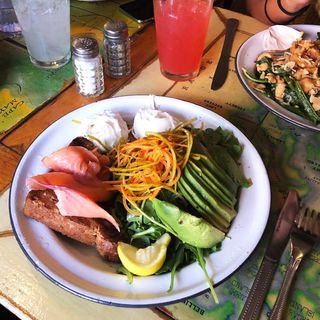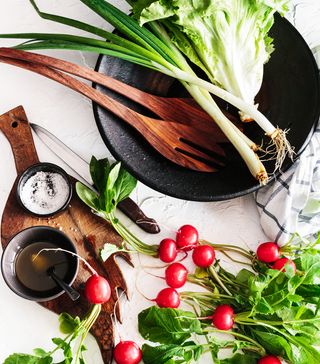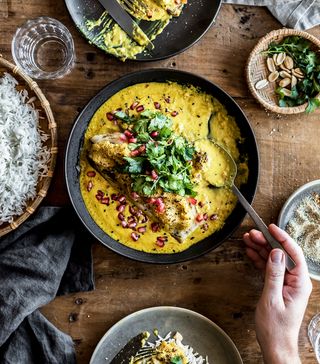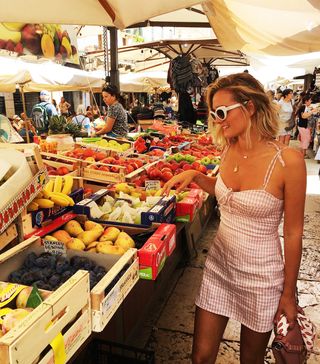How to Build a Happier Relationship With Your Diet


Meryl Pritchard's followers might consider her the poster child for a highly intuitive, holistic approach to eating—the nutritionist and wellness entrepreneur built a brand from this ethos, after all. But long before she modeled this wisdom into a business, Pritchard was confronting her own anxieties with her diet head-on.
"I had a poor relationship with food throughout my young-adult life because I simply didn't understand how food worked in my body," she recalls. "When I went to college and was left to my own devices, I ate whatever was easy, convenient, and tasted good. This meant bagels, boxed mac and cheese, chips, sugar, and basically anything that came in a package."
The trajectory that followed might sound all too familiar for some of us. "My body changed so fast that I didn't even know what was happening," she says. After gaining weight, Pritchard began experimenting with yo-yo dieting and restriction before finally learning about a plant-based style of eating—by way of Alicia Silverstone's best-selling book, The Kind Diet ($10).
"It revealed some truths behind the mass-produced-food industry and focused on plant-based, whole-food recipes," she says. "This was exciting and new for me, and it ultimately changed my life. I started eating this way and noticed how good I felt. Then I adjusted her plan to my own body's needs by incorporating fish and eggs back in. I was learning to listen to my body and which foods helped it thrive."
Learning to be mindful about what she ate was the first step in learning what "nourishment" could really mean—namely, that it was about so much more than satiating and fueling her body. "Food is a lot more than just calories; it’s information," she says. "It talks to your DNA and tells it what to do. You have the ability to turn symptoms on and off just by changing your diet. Everything you eat is composed of energy. You consume that energy, and it becomes a part of you. That's why I believe that it's important to put high vibrational foods into your body if you want to be a high vibrational being. The body is smart, and nature provides literally everything we need to thrive."
It's an aspirational approach, to be sure. But the prospect of reshaping a fraught or unrewarding relationship with food can also be daunting. Below, Pritchard explains where to begin.

Practice mindful eating
Pritchard looks to ancient medicine as her chief inspiration for a more balanced way of eating. "In Ayurveda, mindful eating is the key to good digestion," she says. "The digestive process begins when you start by smelling all the fresh herbs and food being prepared in the kitchen. You listen to the sounds the food is making as it's being chopped, prepared, cooked, and baked. When the meal is ready, you absorb the presentation of a beautiful meal with your eyes. When you sit down to eat, you touch the food to feel the consistency and temperature. Your saliva is already being secreted before you even put the first bite into your mouth. Then you chew and taste the food in your mouth, hitting all your taste buds."
It might sound like a lot to think about at first, but practicing this mindful approach can actually transform the way you experience food. (It's definitely a far cry from shoveling food in your mouth while catching up on your inbox.) "This process allows you to have a better connection to your food," she says. "When you're more connected, you're more present and eating in a more mindful manner. A meal takes time to prepare, and it also takes time to eat. You should eat your food slowly and thoroughly, giving yourself the opportunity to enjoy every bite."
Establish post-meal rituals
Immediately jumping to the next thing on your to-do list doesn't just diminish the sensory experience of your meal—it can also mess with your digestion.
"After every meal, stay seated for about 15 minutes so the acid in your stomach isn't moving around," says Pritchard. "Then you can take a short, slow 15-minute walk to help complete the digestive process. I promise if you try this, you will feel really good, even after a large meal. Ayurveda recognizes that how we eat can have just as much of a positive and transformational effect as what we consume."
Eat for energy

Recognizing hunger cues is an important aspect of mindfulness, but satiation shouldn't be your only reason for eating. Pritchard suggests focusing on the energy boost you get from eating a nutritious meal. "When you focus on that, you'll make better choices that will have a positive impact on your overall well-being," she says.
Indulge with gratitude—and without guilt
Yes, a wholesome, nutritious diet is ideal if you want to consistently feel your best. But if you eat healthfully on the regular, there's no reason why you can't enjoy treats in moderation, which nourish us in a completely different way.
"My teacher in India gave us an analogy about eating a cupcake," says Pritchard. "You can go into it thinking, This cupcake is bad for me, and it's a lot of sugar and calories and is going to make me fat, but I'm going to eat it anyways and feel super guilty about it. When you eat the cupcake in that mindset, your body is going to react to that feeling and digestion is going to be harder because you might be in an anxious state."
An attitude shift can make all the difference, however. "Instead, go into it thinking, This beautiful cupcake was made by a baker who woke up early and put all of their energy into making it taste just right," she says. "It's such a treat and a joy that I get to eat this. I deserve a cupcake because I work really hard and I know it's going to taste amazing."
Ultimately, she says, "it's all about themind-bodyy connection."
Become a regular at your local farmers market

It's not just about making better choices for the environment and supporting local farmers—or making healthier choices, for that matter. These are all amazing reasons to shop your local market, but Pritchard emphasizes the relationship you build with your ingredients by seeing them in their whole form. "It helps you feel more inspired by food and appreciate all the work that went into getting it to you," she says.
That's not to mention that this ritual might encourage you to try out some new things. "I also find I’m more adventurous with the foods that I eat when I shop this way," she says. "You can be at a farmer's stand in the market and see someone buying some beautiful deep-purple-colored eggplant, something you were not planning on buying or maybe have never bought before."
Get comfortable in your kitchen
Even if you historically store shoes in your oven à la Carrie Bradshaw, you're not a lost cause when it comes to cooking for yourself. The beauty of working with fresh, whole foods is that they tend to be rich in flavor and don't require much in the way of culinary expertise. A lot of vegetables taste phenomenal when roasted with olive oil and some salt and pepper.
"Cooking for yourself is an act of self-care," says Pritchard. "The process doesn't have to be long, hard, or complicated. When I started my meal-delivery service, I barely knew how to cook. I had to talk to Siri every day to learn how to boil an egg and bake chicken breast. All of the meals I made for clients were very simple and rudimentary, but they still loved them because they were fresh, seasonal, and healthy. The more comfortable I got in the kitchen, the more my diet improved. I felt in control, and I was able to infuse my own love and energy into every meal."
Next up: How to take adaptogens so that they actually work.
Disclaimer
This article is provided for informational purposes only and is not intended to be used in the place of advice of your physician or other medical professionals. You should always consult with your doctor or healthcare provider first with any health-related questions.